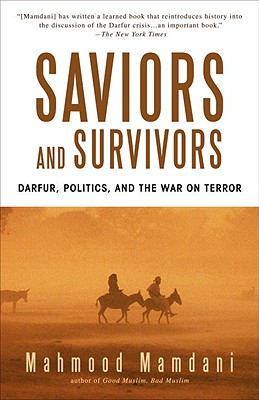

 Three Rivers Press (CA)
Three Rivers Press (CA)
Saviors and Survivors: Darfur, Politics, and the War on Terror


Key Metrics
- Mahmood Mamdani
- Three Rivers Press (CA)
- Paperback
- 9780385525961
- 8 X 5.2 X 0.9 inches
- 1 pounds
- History > Africa - North
- English
 Secure Transaction
Secure TransactionBook Description
In Saviors and Survivors, Mahmood Mamdani explains how the conflict in Darfur began as a civil war (1987--89) between nomadic and peasant tribes over fertile land in the south, triggered by a severe drought that had expanded the Sahara Desert by more than sixty miles in forty years; how British colonial officials had artificially tribalized Darfur, dividing its population into native and settler tribes and creating homelands for the former at the expense of the latter; how the war intensified in the 1990s when the Sudanese government tried unsuccessfully to address the problem by creating homelands for tribes without any. The involvement of opposition parties gave rise in 2003 to two rebel movements, leading to a brutal insurgency and a horrific counterinsurgency-but not to genocide, as the West has declared.
Mamdani also explains how the Cold War exacerbated the twenty-year civil war in neighboring Chad, creating a confrontation between Libya's Muammar al-Qaddafi (with Soviet support) and the Reagan administration (allied with France and Israel) that spilled over into Darfur and militarized the fighting. By 2003, the war involved national, regional, and global forces, including the powerful Western lobby, who now saw it as part of the War on Terror and called for a military invasion dressed up as humanitarian intervention.
Incisive and authoritative, Saviors and Survivors will radically alter our understanding of the crisis in Darfur.
Author Bio
Mahmood Mamdani is the Herbert Lehman Professor of Government. He received his PhD from Harvard University in 1974 and specializes in the study of African history and politics. His works explore the intersection between politics and culture, a comparative study of colonialism since 1452, the history of civil war and genocide in Africa, the Cold War and the War on Terror, and the history and theory of human rights. Prior to joining the Columbia faculty, Mamdani was a professor at the University of Dar-es-Salaam in Tanzania (1973–1979), Makerere University in Uganda (1980–1993), and the University of Cape Town (1996–1999).
He has received numerous awards and recognitions, including being listed as one of the "Top 20 Public Intellectuals" by Foreign Policy (US) and Prospect (UK) magazine in 2008. From 1998 to 2002, he served as President of CODESRIA (Council for the Development of Social Research in Africa). His essays have appeared in the New Left Review and the London Review of books, among other journals.
He teaches courses on: major debates in the study of Africa; the modern state and the colonial subject; the Cold War and the Third World; the theory, history, and practice of human rights; and civil wars and the state in Africa.
Mamdani’s books include Saviors and Survivors: Darfur, Politics, and the War on Terror (2009); Good Muslim, Bad Muslim: America, the Cold War and the Roots of Terror (2004); When Victims Become Killers: Colonialism, Nativism and Genocide in Rwanda (2001); Citizen and Subject: Contemporary Africa and the Legacy of Late Colonialism (1996), which was awarded the Herskovitz Prize of the African Studies Association; Politics and Class Formation in Uganda (1976); From Citizen to Refugee(1973); and The Myth of Population Control: Family, Class and Caste in an Indian Village (1972).
Columbia University Department of Anthropology
Videos








Community reviews
Write a ReviewNo Community reviews